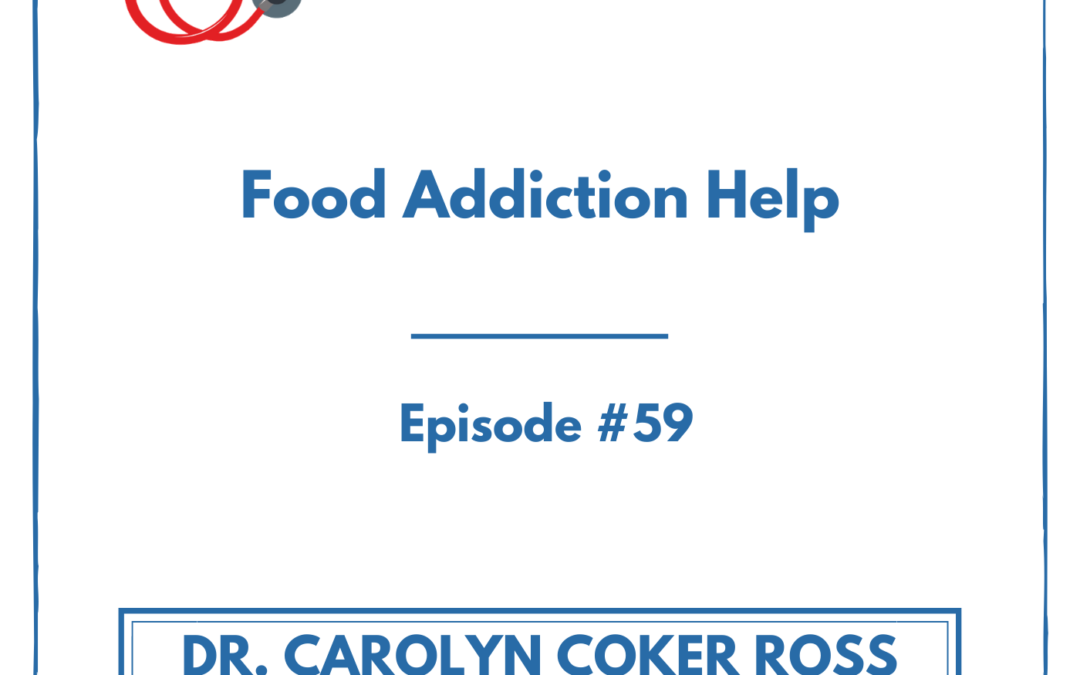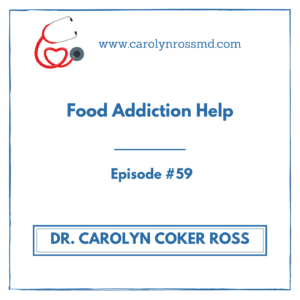Food addiction, like addiction to drugs or alcohol, often begins as a way to manage stress, turn up the volume on pleasant emotions (like happiness or comfort), or dampen uncomfortable feelings (like anxiety, anger, or sadness). Since 2010, researchers at Yale University have been using the Yale Food Addiction Scale (YFAS) to identify people with food addiction. Binge eating disorder shares a number of characteristics with food addiction.
To download the guided imagery mentioned in the podcast, use this link: https://carolynrossmd.com/journey-of-discovery/
To learn more about the Anchor Program for food addiction, emotional eating and binge eating: https://AnchorProgram.com
Check out my TEDxPleasantGrove talk on Intergenerational trauma here: https://youtu.be/ljdFLCc3RtM
Hi everyone and welcome to the podcast. This is Dr. Carolyn and today’s topic is food addiction help. If you’re struggling with obsessive thoughts about food, if you are feeling that certain foods kind of have your name on them, they’re always calling to you. Then you need this food addiction help. So stay tuned.
Okay, well, food addiction like addiction to drugs or alcohol can begin as a way to manage stress, or it may be a way that you have used to turn up the volume on pleasant emotions like happiness or comfort. You may also use food to dampen uncomfortable feelings like anxiety, anger, or sadness, as you know, alcohol and drug addictions are specific and that they center on addiction to a substance. If you struggle with food addiction, this is what’s called a behavioral addiction. In other words, you may be addicted to or dependent on behaviors rather than substances. Behavioral addictions can involve things like compulsive sex, gambling, or shopping.
Now food addiction can also involve restricting your food intake or bingeing. In other words, eating large quantities of food in a short period of time, you may have difficulty stopping these behaviors and you can also get a sort of a natural high similar to that we see with alcohol and drug addiction with using your food fix, whether it be chocolate or other sweets or even chicken or salty foods, but any addiction, whether it be to food or to a substance like drugs or alcohol, share some common characteristics in that they are chronic and have numerous relapses. They involve a compulsion to seek and use a behavior or substance, and also loss of control over how much and when you use or obsess about you’re using for people with food addiction, when you’re food fix, as I call it, it’s not available. You may feel panicked, angry, sad, or otherwise distressed.
Now there’s a lot of research that’s been going on over the past decade, since 2010, researchers at Yale University have been using the Yale food addiction scale to identify people with food addiction and they’re using the same criteria that we use to diagnose people with drug and alcohol use disorders. And they have found that about. Five to 10% of the general population test positive on the Yale food addiction scale, including 7% of children who were tested. Now, the Yale food addiction scale also shows food addiction is 15 to 25% higher in those who are living in larger bodies. Even higher rates of food addiction are found in those seeking bariatric surgery or in people living with living in larger bodies who have already been diagnosed with binge eating disorder and that number is 30 to 50%. So binge eating disorder shares a number of characteristics with what we call food addiction, 57% of people who have been diagnosed with binge eating disorder also meet criteria on the Yale food addiction scale for food addiction in both disorders. People experience a lack of control over their eating. They also continue to overeat despite negative consequences and they have a difficult time changing or stopping their behaviors. Now, if that sounds familiar, again, these are the same criteria we use for people with say a heroin addiction or alcohol use disorder. In those cases, it would be a lack of control over the use of alcohol or drugs and inability to stop those behaviors despite negative consequences, though, there is some overlap between binge eating disorder and food addiction there are also some differences. People with food addiction tend to experience high, even higher levels of poor self-esteem, depression and difficulty regulating their emotions. Now, those who scored positive on the Yale food addiction scale for food addiction tended to get more of their calories from fat and protein, rather than carbohydrates as compared to those without food addiction. And they were also more likely to have a history of child physical or sexual abuse.
Once you began down this road of eating too much of certain foods that you obsess about. It’s like a vicious circle that starts where you eat too much of your particular food that you feel addicted to and then imbalances develop in your body and your brain that then lead you to crave those specific foods.
And that is one of the symptoms of food addiction. Now, this is exactly the same as what happens with drug of abuse, drugs of abuse. Now not again, just to remind you, not everyone who uses it, drugs or drinks or obsesses about particular foods becomes addicted. Not everyone who eats chocolate becomes addicted. If you can believe that now, if we’re using food to deal with either positive or negative emotions and or if food is your way of escaping from the troubles that you have in life or finding comfort or soothing loneliness, which I think is one that’s really common among the patients that I see then basically it’s how you use this food that’s the problem. Not specifically the food itself, we know that drugs or potentially addictive and in many ways, eating is potentially addictive too, because both effect that dopamine reward center, which is the brain’s pleasure center. Anything you do that gives you reward can potentially be abused and you could become addicted to it, whether it’s food, sex, gambling, drinking, or any other activity.
However, here’s the important thing, if you focus only on eliminating the food, you feel as responsible for your addiction. First of all, that doesn’t work because we can never deprive ourselves of something that, that. Feeling of deprivation just sets you up for the next binge but beyond that, you’ll also miss out on a deeper form of recovery in this deeper form is a journey to discovery because so many people with addictions have never known who they really are at their essence, or they’ve forgotten because they’ve been locked into this battle with food or with their body for so long. So, what I’m encouraging is that you open up your mind a little bit to the idea that you’re addicted to a particular way of using food. Because unlike drugs you can’t abstain from food, you and you may think, okay, well, Dr. Carolyn can’t I abstain from chocolate or can’t I abstain from chips. Again, anytime you deprive yourself, that deprivation sets you up for the next binge. So that just, if you, if you decide that certain foods are bad or wrong, or quote, unquote addictive, you’ll just continue in the same cycle of keeping yourself away from those foods and then feeling a compulsion to eat them and then feeling ashamed or guilty about overeating the mindset associated with your obsession, with food that has caused you so much pain and suffering already. Now, more than any medical risk food addiction is psychologically debilitating and thoughts about food, you know, obsessions about food, I should say, or about, your next binge or about your size can take over your life and make you feel isolated, hopeless, and unhappy. Sometimes people who obsess about food also feel low self-esteem like they’re not worthy. They may have anxiety or panic attacks or feel sad, irritable, or emotionally detached or numb. This can even affect your work performance. It can affect relationships. I’ve had numerous patients tell me that, they’ve been in good relationships, but their obsession with food and their body image has destroyed those relationships. People with food addiction often avoid social events because of embarrassment about their eating behaviors. So it’s important to heal from your food addiction and enable you to get back to the life you want and the life you deserve, frankly, nobody deserves to suffer over you know, this, this type of food addiction.
So in the show notes will be a link to a meditation that I use a guided imagery that I use with my clients that will help you address your food addiction behaviors. So I encourage you to check that out. I want to also do a little bit of a brag that this podcast was selected as number one in the Top Five Food Addiction Podcasts to Follow in 2020 by Feed Spot. So I’m really proud of that, I would appreciate also if you’d leave a review for our podcast to help us get the word out. So in upcoming podcast, I will be talking more about specific actions you can take, but be sure and download that guided imagery that’s in the show notes. So I think that will really help kickstart your journey to discovering who you really are beyond the food.
This is Dr. Carolyn signing off I’ll talk to you soon.









